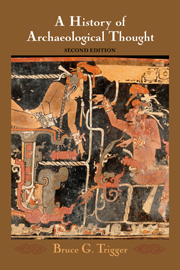Book contents
- Frontmatter
- Contents
- LIST OF ILLUSTRATIONS
- PREFACE TO THE SECOND EDITION
- 1 Studying the History of Archaeology
- 2 Classical and Other Text-Based Archaeologies
- 3 Antiquarianism without Texts
- 4 The Beginnings of Prehistoric Archaeology
- 5 Evolutionary Archaeology
- 6 Culture-Historical Archaeology
- 7 Early Functional-Processual Archaeology
- 8 Processualism and Postprocessualism
- 9 Pragmatic Synthesis
- 10 The Relevance of Archaeology
- BIBLIOGRAPHICAL ESSAY
- REFERENCES
- INDEX
3 - Antiquarianism without Texts
Published online by Cambridge University Press: 05 June 2014
- Frontmatter
- Contents
- LIST OF ILLUSTRATIONS
- PREFACE TO THE SECOND EDITION
- 1 Studying the History of Archaeology
- 2 Classical and Other Text-Based Archaeologies
- 3 Antiquarianism without Texts
- 4 The Beginnings of Prehistoric Archaeology
- 5 Evolutionary Archaeology
- 6 Culture-Historical Archaeology
- 7 Early Functional-Processual Archaeology
- 8 Processualism and Postprocessualism
- 9 Pragmatic Synthesis
- 10 The Relevance of Archaeology
- BIBLIOGRAPHICAL ESSAY
- REFERENCES
- INDEX
Summary
Knowing the past is as astonishing a performance as knowing the stars.
george kubler, The Shape of Time (1962), p. 19The first archaeologists were only interested in historical times. They sought to use major works of art and architecture from the past to extend their knowledge of ancient civilizations that were already familiar to them from written records. Although they progressively enhanced their ability to elicit information about human behavior from material remains, they did not at first seek to study peoples about whom there was no written documentation. In the German academic tradition, the term archaeology (Archäologie) remains generally restricted to this sort of archaeology, whereas prehistoric archaeology is called Urgeschichte (history of beginnings) or Frühgeschichte (early history). Elsewhere the term archaeology was extended to the study of prehistory as the latter activity became more professionalized (Gran-Aymerich 1998: 128–30). Both classical and prehistoric archaeology grew out of a less professional and at first largely undifferentiated antiquarianism.
As a result of the work of prehistoric archaeologists, today we know that historical archaeologists ignored at least 95 percent of human history extending from the earliest known hominids who existed some four million years ago to the nonliterate peoples who lived in many parts of the world until recent times. In this chapter, we will examine how archaeology began to develop in northern and central Europe, where historical records usually do not antedate the Roman period and in some areas began only after ad 1000.
- Type
- Chapter
- Information
- A History of Archaeological Thought , pp. 80 - 120Publisher: Cambridge University PressPrint publication year: 2006
- 2
- Cited by



